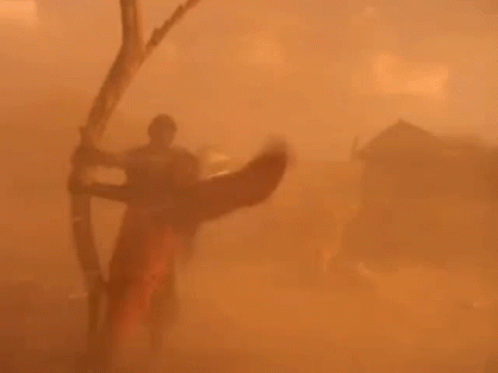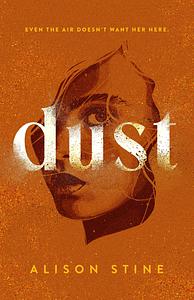Take a photo of a barcode or cover
Dust is one part coming-of-age story, one part climate change lecture, with a generous sprinkle of doom. Thea’s family decides to start fresh in the ominously named Bloodless Valley. Unsurprisingly, they find themselves in a dry, dusty wasteland where crops barely grow and everything is just… sad.

Thea’s life is as desolate as the landscape. Her parents have all but locked her in the farmhouse, homeschooling her just enough to make you wonder if her mom is following some 1930s curriculum she found in the attic. Thea's only reprieve? The café job, which her parents reluctantly allow so she can contribute to the family’s apocalyptic lifestyle fund.
The best part, hands down, is the local librarian. Even though Thea’s parents are vehemently averse to books published after 1992, the librarian is out here issuing library cards like he’s part of some underground literary rebellion. Every time he pushes a book at Thea, it’s like a tiny revolt against the bleakness of Bloodless Valley and the never-ending climate gloom. Librarians saving the world, one forbidden book at a time!
The story has some solid character moments, especially when Thea meets Ray and begins learning to sign—a beautiful, quiet rebellion against her parents’ insistence that she “pass” as hearing. Through him, Thea finally finds someone who gets her—someone who doesn’t care about her parents’ rules or the bleakness of the Valley. Ray teaches her sign language on the sly, and it opens up a whole new world for her. There’s love, there’s rebellion, and there’s a refreshing sense of identity… if only the unending thirst and climate anxiety didn’t linger in the background.
The climate change references are a tad heavy-handed. The droughts, dying crops, and dust storms are constant reminders that we’re basically one bad weather pattern away from the plot of this novel. And while the message is important, it sometimes feels like you’re being beaten over the head with a sledgehammer. Overall, it’s a gritty story with an interesting premise, a heroine trying to find herself in a world of dust and desperation, and a librarian who really gets it.

Thea’s life is as desolate as the landscape. Her parents have all but locked her in the farmhouse, homeschooling her just enough to make you wonder if her mom is following some 1930s curriculum she found in the attic. Thea's only reprieve? The café job, which her parents reluctantly allow so she can contribute to the family’s apocalyptic lifestyle fund.
The best part, hands down, is the local librarian. Even though Thea’s parents are vehemently averse to books published after 1992, the librarian is out here issuing library cards like he’s part of some underground literary rebellion. Every time he pushes a book at Thea, it’s like a tiny revolt against the bleakness of Bloodless Valley and the never-ending climate gloom. Librarians saving the world, one forbidden book at a time!
The story has some solid character moments, especially when Thea meets Ray and begins learning to sign—a beautiful, quiet rebellion against her parents’ insistence that she “pass” as hearing. Through him, Thea finally finds someone who gets her—someone who doesn’t care about her parents’ rules or the bleakness of the Valley. Ray teaches her sign language on the sly, and it opens up a whole new world for her. There’s love, there’s rebellion, and there’s a refreshing sense of identity… if only the unending thirst and climate anxiety didn’t linger in the background.
The climate change references are a tad heavy-handed. The droughts, dying crops, and dust storms are constant reminders that we’re basically one bad weather pattern away from the plot of this novel. And while the message is important, it sometimes feels like you’re being beaten over the head with a sledgehammer. Overall, it’s a gritty story with an interesting premise, a heroine trying to find herself in a world of dust and desperation, and a librarian who really gets it.
adventurous
informative
reflective
tense
medium-paced
Plot or Character Driven:
Character
Strong character development:
Yes
Loveable characters:
Yes
Diverse cast of characters:
Complicated
Flaws of characters a main focus:
Yes
emotional
reflective
medium-paced
Plot or Character Driven:
Character
Strong character development:
Yes
Loveable characters:
Yes
Flaws of characters a main focus:
Yes
mysterious
reflective
slow-paced
Plot or Character Driven:
A mix
Strong character development:
Yes
Loveable characters:
Yes
Diverse cast of characters:
Complicated
Flaws of characters a main focus:
No
dust is about thea, a hard of hearing teen struggling with her family’s decision to move to Colorado after they experience floods in Ohio. it’s been a while since i’ve read a ya coming of age story, and i really appreciated the different themes of climate change and thea’s struggles with hearing. the pacing of this book was really slow however, and it took a long time for the story to unfold. i liked how the author wrote about thea’s experiences, particularly how words were cut out of a sentence because thea didn’t hear it. as a reader, it helped me understand her frustration.
overall, a thoughtful read that builds up slowly.
adventurous
dark
informative
fast-paced
Plot or Character Driven:
A mix
Strong character development:
Yes
Loveable characters:
Yes
Diverse cast of characters:
Yes
Flaws of characters a main focus:
Complicated
3.25/5
For starters this is my second book I have read where the main character had a form of hearing loss. Which honestly makes me a little sad? Just because there aren't a lot of books that come out where the MC has a hearing disability, similar to me. In the book itself I enjoyed the portrayal of not being able to hear, I felt that was very well done because it is like that sometimes 😂. Sometimes, you really don't hear what the person says at all, and you're forced to mentally fill in the gaps. In terms of the dystopian aspect of the book, I felt like it was really well done as well. With the alternate history being snuck in there I barely had time to recall what had happened to fix the Dust Bowl itself. My only issue with the book was that for me, I just had a hard time getting excited to read it, though that is defiantly on me because of me being a mood reader. Overall, it was a solid dystopian though and great HoH/Deaf rep.
For starters this is my second book I have read where the main character had a form of hearing loss. Which honestly makes me a little sad? Just because there aren't a lot of books that come out where the MC has a hearing disability, similar to me. In the book itself I enjoyed the portrayal of not being able to hear, I felt that was very well done because it is like that sometimes 😂. Sometimes, you really don't hear what the person says at all, and you're forced to mentally fill in the gaps. In terms of the dystopian aspect of the book, I felt like it was really well done as well. With the alternate history being snuck in there I barely had time to recall what had happened to fix the Dust Bowl itself. My only issue with the book was that for me, I just had a hard time getting excited to read it, though that is defiantly on me because of me being a mood reader. Overall, it was a solid dystopian though and great HoH/Deaf rep.
dark
reflective
tense
emotional
tense
medium-paced
Plot or Character Driven:
Character
Strong character development:
Yes
Loveable characters:
Complicated
Diverse cast of characters:
Yes
Flaws of characters a main focus:
Complicated
“I am different though. Maybe it’s alright if I feel it sometimes. Maybe it’s wrong to just ignore it.”
This was the DEAFiniTely Readers Book club pick for January. This story is emotionally affecting especially for those who are deaf. The imagery the author did is CHAMP.
This was the DEAFiniTely Readers Book club pick for January. This story is emotionally affecting especially for those who are deaf. The imagery the author did is CHAMP.
A majority of the book is about showing the differences between a deaf person and hearing person - and how not having access can be detrimental to their life. I related to many of the things that Thea experienced as a deaf person.
The book also talked about climate and social changes, the affect it can have on people. Alison Stine's writing is beautiful. You, as a reader, felt as if you were there.
The book also talked about climate and social changes, the affect it can have on people. Alison Stine's writing is beautiful. You, as a reader, felt as if you were there.
Clearly, the book is focused on Deaf representation. The author has said that she is partially deaf and herself never really understood if she was hearing or deaf. One quote from the book really conveys this:
“What culture? I felt like I was living a half life. Not fully hearing, not fully deaf.”
I did feel that the ending was rushed and things were left unresolved, which is why it is a lower rating than I really wanted to give. I do recommend it as to read if you're looking for deaf characters!
One more quote that really hit me, “What culture? I felt like I was living a half life. Not fully hearing, not fully deaf.”
My full written review can be found on my website - https://authorktjames.com and an ASL Video review on YouTube (https://youtube.com/@authorktjames)
Happy reading!
challenging
dark
emotional
hopeful
informative
reflective
sad
tense
Plot or Character Driven:
A mix
Strong character development:
Yes
Loveable characters:
Yes
Flaws of characters a main focus:
Yes
~~Thank you to NetGalley and St. Martin's Press for the ARC!~~
I wouldn't say I'm disappointed, exactly, but I wouldn't say this is a bad book, either.
I really do like Thea. Her struggles with her hard-of-hearing and her family, specifically her dad, purposely shielding all things "modern" (i.e., the dad just wants to control his family and keep his daughters ignorant, obedient, and sub servant to him only) while hiding her partial deafness were so frustrating to read about, but her determination and yearning for proper education, as well as acknowledgment of her condition, made her a strong main character. The romance with Ray was definitely instalove (Not that I blame her, though. I could only imagine how intense it was for her to have a connection with a fellow deaf person, in the first place), but it doesn't take much away from her character for me to make a bigger deal about it.
The titular force in the book - the dust - is terrifying, and Thea delving into the bigger issues surrounding it (i.e., climate change) only made it worse. There are a few scenes showing us how dangerous these storms are before the final one at the climax, and it was so intense that it had me on the edge of my seat. Stine did an amazing job with these depictions.
The reason why I don't like it anymore is because of my frustration, specifically towards Thea's parents. The dad is so terrible. He deliberately goes out of his way to make life as difficult as possible, and the mom just enables it. I so badly wanted someone to call child services to take Thea and her sister away from these monsters, but, instead, the climax storm changes their minds and they're good now. It's implied that it would be a slow change, but I really don't believe either of them would have even considered the change if they were real. It just made me too mad, and the reminder that there are still too many parents out there right now with "unschooling" mindsets destroying their kids' development just soured my reading experience as a whole.
All in all, this is still a good book with great insights regarding climate change, but I just couldn't believe the parents' character development.
I wouldn't say I'm disappointed, exactly, but I wouldn't say this is a bad book, either.
I really do like Thea. Her struggles with her hard-of-hearing and her family, specifically her dad, purposely shielding all things "modern" (i.e., the dad just wants to control his family and keep his daughters ignorant, obedient, and sub servant to him only) while hiding her partial deafness were so frustrating to read about, but her determination and yearning for proper education, as well as acknowledgment of her condition, made her a strong main character. The romance with Ray was definitely instalove (Not that I blame her, though. I could only imagine how intense it was for her to have a connection with a fellow deaf person, in the first place), but it doesn't take much away from her character for me to make a bigger deal about it.
The titular force in the book - the dust - is terrifying, and Thea delving into the bigger issues surrounding it (i.e., climate change) only made it worse. There are a few scenes showing us how dangerous these storms are before the final one at the climax, and it was so intense that it had me on the edge of my seat. Stine did an amazing job with these depictions.
The reason why I don't like it anymore is because of my frustration, specifically towards Thea's parents. The dad is so terrible. He deliberately goes out of his way to make life as difficult as possible, and the mom just enables it. I so badly wanted someone to call child services to take Thea and her sister away from these monsters, but, instead, the climax storm changes their minds and they're good now. It's implied that it would be a slow change, but I really don't believe either of them would have even considered the change if they were real. It just made me too mad, and the reminder that there are still too many parents out there right now with "unschooling" mindsets destroying their kids' development just soured my reading experience as a whole.
All in all, this is still a good book with great insights regarding climate change, but I just couldn't believe the parents' character development.
i am the QUEEN of slapping yet another novel down on the counter of my TBR and picking it back up months later with 150% misguided overconfidence that i can correctly recall exactly what the book is about - only to be shocked and appalled at how absurdly wrong i am when said book does not meet my lofty expectations
needless to say, i assumed with what can only be described as teenage certainty that this was about a deaf girl in a dystopian Mad Max western expanse a la Blood Road and this most certainly is not that
and i am so utterly disappointed and only have myself to blame
so yeah DNF @ page 3, because i am a bloody buffoon who thinks she knows better than a book’s synopsis
needless to say, i assumed with what can only be described as teenage certainty that this was about a deaf girl in a dystopian Mad Max western expanse a la Blood Road and this most certainly is not that
and i am so utterly disappointed and only have myself to blame
so yeah DNF @ page 3, because i am a bloody buffoon who thinks she knows better than a book’s synopsis







